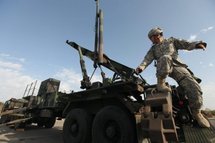
A US army officer attends a joint US-Israeli military training
Oman has also been approached, although no Patriot missiles have been deployed there yet, US officials told the newspaper, adding that the willingness of other Arab states to accept the US defenses reflects growing unease in the region over Iran's ambitions and capabilities.
"Our first goal is to deter the Iranians," a senior administration official told the newspaper. "A second is to reassure the Arab states, so they don't feel they have to go nuclear themselves. But there is certainly an element of calming the Israelis as well."
The deployments could also forestall any Iranian retaliation in response to the sanctions, as well as discourage staunch US ally Israel from launching a military strike against Tehran's nuclear and military facilities.
Washington is seeking to win over its allies to slap a fourth set of UN sanctions on Iran that would target the Iranian Revolutionary Guards Corps believed to control the military aspect of Tehran's controversial nuclear program.
Friday, Secretary of State Hillary Clinton upped the pressure on China to recognize the threat from Iran's nuclear program -- which Washington and its Western allies say aims to produce nuclear weapons despite Tehran's insistence otherwise -- and join international calls for sanctions.
General David Petraeus, who heads the US Central Command that oversees US military operations stretching from the Gulf to Central Asia, said the sped-up deployment of missile systems included eight Patriot missile batteries, "two in each of four countries."
The unusually public comments about the accelerated deployments, which began under President Barack Obama's predecessor, George W. Bush, came during an address at the Institute for the Study of War in Washington on January 22.
"Iran is clearly seen as a very serious threat by those on the other side of the Gulf front, and indeed, it has been a catalyst for the implementation of the architecture that we envision and have now been trying to implement," he said at the time.
The United States was also keeping Aegis guided missile cruisers, equipped with advanced radar and anti-missile systems that can intercept medium-range missiles, on patrol in the Gulf at all times, according to Petraeus.
Though those systems are not designed to intercept Iran's long-range missile, the Times noted that intelligence agencies estimate it will take Tehran years before it can place a nuclear warhead atop the Shahab III.
A senior military official told the newspaper that Petraeus began speaking openly about the deployments about a month ago, as Tehran declined the Obama administration's offer of engagement and Washington faced growing challenges to impose sanctions against the Islamic Republic.
-------------------------------------------------------------------------------
"Our first goal is to deter the Iranians," a senior administration official told the newspaper. "A second is to reassure the Arab states, so they don't feel they have to go nuclear themselves. But there is certainly an element of calming the Israelis as well."
The deployments could also forestall any Iranian retaliation in response to the sanctions, as well as discourage staunch US ally Israel from launching a military strike against Tehran's nuclear and military facilities.
Washington is seeking to win over its allies to slap a fourth set of UN sanctions on Iran that would target the Iranian Revolutionary Guards Corps believed to control the military aspect of Tehran's controversial nuclear program.
Friday, Secretary of State Hillary Clinton upped the pressure on China to recognize the threat from Iran's nuclear program -- which Washington and its Western allies say aims to produce nuclear weapons despite Tehran's insistence otherwise -- and join international calls for sanctions.
General David Petraeus, who heads the US Central Command that oversees US military operations stretching from the Gulf to Central Asia, said the sped-up deployment of missile systems included eight Patriot missile batteries, "two in each of four countries."
The unusually public comments about the accelerated deployments, which began under President Barack Obama's predecessor, George W. Bush, came during an address at the Institute for the Study of War in Washington on January 22.
"Iran is clearly seen as a very serious threat by those on the other side of the Gulf front, and indeed, it has been a catalyst for the implementation of the architecture that we envision and have now been trying to implement," he said at the time.
The United States was also keeping Aegis guided missile cruisers, equipped with advanced radar and anti-missile systems that can intercept medium-range missiles, on patrol in the Gulf at all times, according to Petraeus.
Though those systems are not designed to intercept Iran's long-range missile, the Times noted that intelligence agencies estimate it will take Tehran years before it can place a nuclear warhead atop the Shahab III.
A senior military official told the newspaper that Petraeus began speaking openly about the deployments about a month ago, as Tehran declined the Obama administration's offer of engagement and Washington faced growing challenges to impose sanctions against the Islamic Republic.
-------------------------------------------------------------------------------









 Home
Home Politics
Politics









